Events
Second SSC Alumni Meeting in Japan Held in Connection to SSP's 5th Anniversary Symposium
On the morning of November 11, the 2nd Japan SSC Alumni Meeting was held at Seihoku Gallery (Faculty of Agriculture, the University of Tokyo). Out of 15 members who attended, 12 members delivered presentations about their endeavors in relation to Sakura Science Plan (SSP). The new main coordinator for Japan, Mr. Lai Hung Wei (Japan coordinator since 2016) acted as the facilitator.
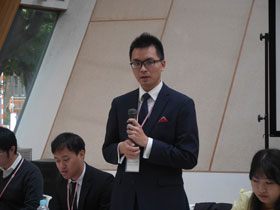
Mr. Lai Hung Wei
New SSC Japan Main Coordinator
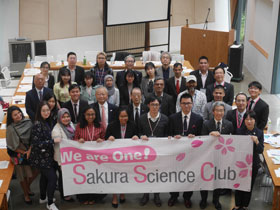
Members and guests from overseas
celebrate the 5th year of Sakura Science
8 international guests including main coordinators from India, Malaysia and Vietnam commented on the future of SSP and SSC activities. Ms. Yixin Xu expressed of her will to build SSC networks inside China so they can collaborate with SSC alumni groups in other countries. Dr. D. Sundar (IIT Delhi), Dr. Jeetender Chugh (India main coordinator), Ms. Nur Shakila binti Muzammir (Malaysia main coordinator) and Dr. Artiwan Shotipruk (Chulalongkorn University) mentioned how Sakura Science led to active joint research with Japan and more exchange in universities/institutes. Mr. J.G. Shanta Siri (National Science Foundation, Sri Lanka) encouraged SSC members to actively mentor youths in their country, to raise awareness and to make use of online platforms that are also usable in rural areas. Ms. Nguyen Thi Thuy Ha who oversees the high school program in Vietnam suggested that SSP would be even better if there is a new program for high school science teachers. She also suggested that extending the program period would lead to more grass-roots exchange with Japanese students or lecturers. Mr. Ngo Van Quyen (Vietnam main coordinator) stated the need for a common knowledge-sharing platform.
For ways to improve SSC activities and to create reasons for engagement, Mr. Nguyen Chi Long (Japan coordinator since 2016) summarized various opinions voiced at the coordinators' pre-meeting held on November 10. One idea was to ask members to send in scientific or social project proposals and to announce the awardees at alumni meetings. The awardees will receive funds to execute their plans. Remarkable projects could be selected either by JST or by SSC member votes. Dr. Jeetender Chugh suggested to match timing of alumni meetings with some cultural event in Japan. Many of such new ideas are described in the article below featuring the SSC coordinators' pre-meeting.
After the Japan alumni meeting, members participated in SSP's 5th Anniversary Symposium, held at the adjacent Yayoi Auditorium of Ichijo Hall.
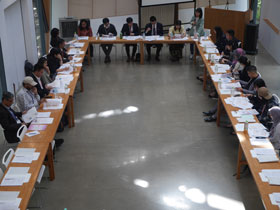
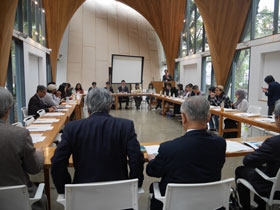
At Seihoku Gallery inside the University of Tokyo, Faculty of Agriculture
SSC Alumni Coordinators Get Together at JST to Propose Change
On November 10─the evening before the Japan alumni meeting─SSC volunteer coordinators got together at JST for a brain-storming session in two groups (A and B) to improve and develop alumni activities. Coordinators came up with many inspiring ideas that will allow JST to conduct more strategic marketing and to gain better public relations opportunities for both Sakura Science Club and Sakura Science Plan. The secretariat and JST immensely thank all coordinators for taking their time to participate.
Group A pointed out that the current SSC homepage, SSC Members' Only SNS and the SSC Facebook page do not have any attractive contents to look forward to. In order to drive viewers, recruitment or internship info could be included as financial stability is crucial to Sakura students studying in Japan. To match today's visual era, SSC can open an official Instagram account for posting a series of member photos with short personal stories. (SSC's take on “Humans of New York” compiled by Brandon Stanton). JST can pick up vital information from the comments section to know what young people are looking for in the program or in alumni activities.
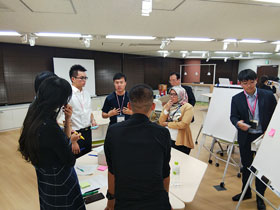
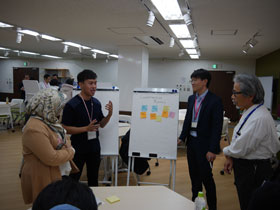
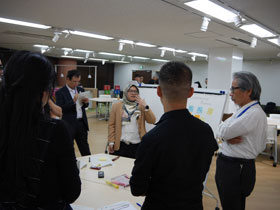
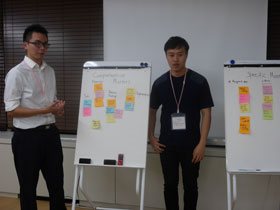
Members of Group A discussed how to motivate engagement in alumni activities and to take steps for more strategic marketing
Another way to liven up meetings could be to conduct a contest to call for research/business/social startup plans and to award the top 10 ideas in Japan. The finalists will get funding from JST to execute their plans. This scheme will not only motivate members, but will also help inspire young people around the world to go for a career in science. The award ceremony during the alumni meeting could also be great PR material.
As a side-project, Group A suggested to compile a yearbook covering members from the original SSP group invited to Japan. This yearbook can help to reconnect and revive friendship.
Group B mentioned that there should be a common platform like Google group where it is easy to track and manage personal information (change of status or location). There is no way to find out who is in Japan now and that could hinder alumni activities. So even if routed through JST, there should be a mechanism where one can email directly to another member or retrieve name lists of a particular group (e.g. Myanmar alumni living in Japan). Members can help each other through Google groups by sharing information on research, etiquettes/life/travel in Japan, or even job-hunting advice. SSC can also open a YouTube Channel for better outreach. Aside from formal events in Tokyo, there could be more casual gatherings like hanami in Kansai, Kanto or Kyushu regions.
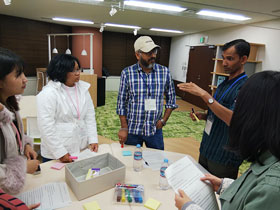
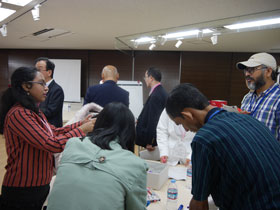
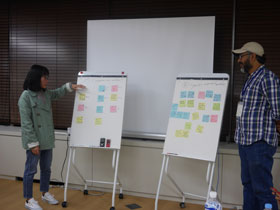
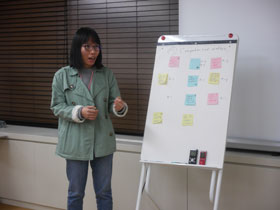
Group B re-emphasized the importance of a common platform where members can help each other and track their current career status
After the wrap-up, Mr. Lai Hung Wei was selected as the new main coordinator for SSC Alumni Association Japan. Ms. Zou Wei had been the main coordinator for Japan since 2016, but she returned to China in September.
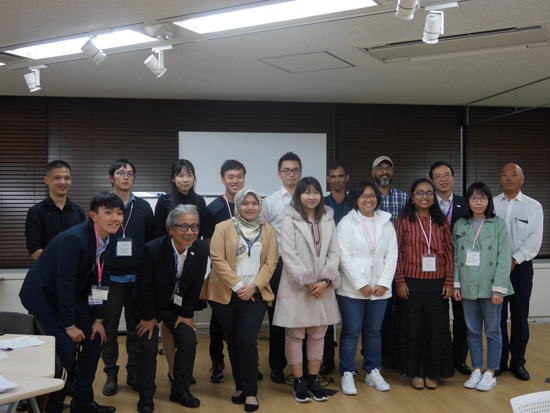
Coordinators' Pre-meeting at JST on November 10
Group A:
Mr. Lai Hung Wei (Malaysia)*, Mr. Nguyen Chi Long (Vietnam)*
Mr. Huang Lei (China), Ms. Xu Yixin (China), Ms. Nur Shakila binti Muzammir (Malaysia), and Mr. Ngo Van Quyen (Vietnam)
Group B:
Ms. Ha Hoang (Vietnam)*, Dr. Jeetender Chugh (India)*
Ms. Pousali Mukherjee (India), Ms. Soe Htet Wai (Myanmar), Ms. Thin Thin Htut (Myanmar), and Mr. J. G. Shanta Siri (Sri Lanka)
*Names in bold are wrap-up speakers







